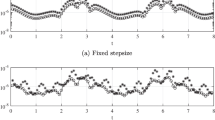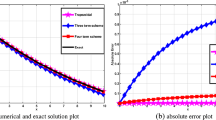Summary
Lanczos type algorithms for solving systems of linear equations have their foundations in the theory of formal orthogonal polynomials and the method of moments which leads to a determinantal formula for their iterates. The various Lanczos type algorithms mainly differ by the way of computing the coefficients entering into the recurrence formulae. If the denominator in the formula for one of these coefficients is zero, then a breakdown occurs in the algorithm, and it must be stopped. Such a breakdown is in fact due to the non-existence of some orthogonal polynomial. In this paper we show how to jump over such a singularity by computing the next existing orthogonal polynomial by the block bordering method. The resulting algorithm, called MRZ, is equivalent to the nongeneric BIODIR algorithm (which is a look-ahead Lanczos type algorithm), but our derivation is much simpler.
Similar content being viewed by others

References
Brezinski, C. (1984): Some determinantal identities in a vector space, with applications, In: H. Werner and H.J. Bünger eds., Padé Approximations and its Applications. Bad-Honnef 1983, LNM 1071. Springer, Berlin Heidelberg New York, pp. 1–11
Brezinski, C. (1980): Padé-type approximation and general orthogonal polynomials. ISMM, Vol. 50. Birkhäuser, Basel
Brezinski, C. (1988): Other manifestations of the Schur complement. Linear Alg. Appl,111, 231–247
Brezinski, C. (1991): Biorthogonality and its Applications to Numerical Analysis. Dekker, New York
Brezinski, C. (1992): CGM A whole class of Lanczos-type solvers for linear systems. Submitted
Brezinski, C., Sadok, H. (1992): Lanczos type algorithms for solving systems of linear equations. Submitted
Brezinski, C., Sadok, H. (1991): Avoiding breakdown in the CGS algorithm, Numerical Algorithms1, 199–206
Brezinski, C., Redivo Zaglia, M. (1991): A new presentation of orthogonal polynomials with application to their computation. Numerical Algorithms1, 207–222
Brezinski, C., Redivo Zaglia, M. (1992): Treatment of near-breakdown in the CGS algorithm. Submitted
Brezinski, C., Redivo Zaglia, M., Sadok, H. (1991): Avoiding breakdown and near-breakdown in Lanczos type algorithms. Numerical Algorithms1, 261–284
Brezinski, C., Redivo Zaglia, M., Sadok, H. (1992): Addendum to “Avoiding breakdown and near-breakdown in Lanczos type algorithms”. Numerical Algorithms2, 133–136
Draux, A. (1983): Polynômes Orthogonaux Formels. Applications, LNM 974. Springer, Berlin Heidelberg New York.
Faddeeva, V.N. (1959): Computational methods of linear algebra. Dover, New York
Fletcher, R. (1976): Conjugate gradient methods for indefinite systems. In: G.A. Watson ed., Numerical Analysis, LNM 506. Springer, Berlin Heidelberg New York, pp. 73–89
Gutknecht, M.H. (1992): A completed theory of the unsymmetric Lanczos process and related algorithms. Part I. SIAM J. Matrix Anal. Appl.13, 594–639
Gutknecht, M.H. (1992): The unsymmetric Lanczos algorithms and their relations to Pade approximation, continued fractions, and the qd algorithm. To appear
Hendriksen, E., Van Rossum, H. (1982): Moment methods in Padé approximation. J. Approx. Theory35, 250–263
Keller, H.B. (1983): The bordering algorithm and path following near singular points of higher nullity. SIAM J. Sci. Stat. Comput.4, 573–582
Joubert, W.D., Manteufel, T.A. (1990): Iterative methods for nonsymmetric linear systems. In: D.R. Kincaid, L.J. Hayes eds., Iterative methods for large linear systems Academic Press, New York, pp. 149–171
Lanczos, C. (1950): An iteration method for the solution of the eigenvalue problem of linear differential and integral operators. J. Res. Natl. Bur. Stand.45, 225–282
Lanczos, C. (1952): Solution of systems of linear equations by minimized iterations. J. Res. Natl. Bur. Stand.49, 33–53
Parlett, B.N., Taylor, D.R., Liu, Z.A. (1985): A look-ahead Lanczos algorithm for unsymmetric matrices. Math. Comput.44, 105–124
Saad, Y. (1982): The Lanczos biorthogonalization algorithm and other oblique projection methods for solving large unsymmetric systems. SIAM J. Numer. Anal.19, 485–506
Struble, G.W. (1963): Orthogonal polynomials: variable-signed weight functions. Numer. Math.5, 88–94
Van der Vorst, H.A. (1992): Bi-CGSTAB: a fast and smoothly converging variant of Bi-CG for the solution of nonsymmetric linear systems. SIAM J. Sci. Stat. Comput.13, 631–644
Vorobyev, Yu.V. (1965): Method of moments in applied mathematics. Gordon and Breach, New York
Young, D.M., Jea, K.C. (1984): Generalized conjugate-gradient acceleration of nonsymmetrizable iterative methods. Linear Algebra Appl.34, 159–194
Author information
Authors and Affiliations
Rights and permissions
About this article
Cite this article
Brezinski, C., Zaglia, M.R. & Sadok, H. A breakdown-free Lanczos type algorithm for solving linear systems. Numer. Math. 63, 29–38 (1992). https://doi.org/10.1007/BF01385846
Received:
Revised:
Issue Date:
DOI: https://doi.org/10.1007/BF01385846



